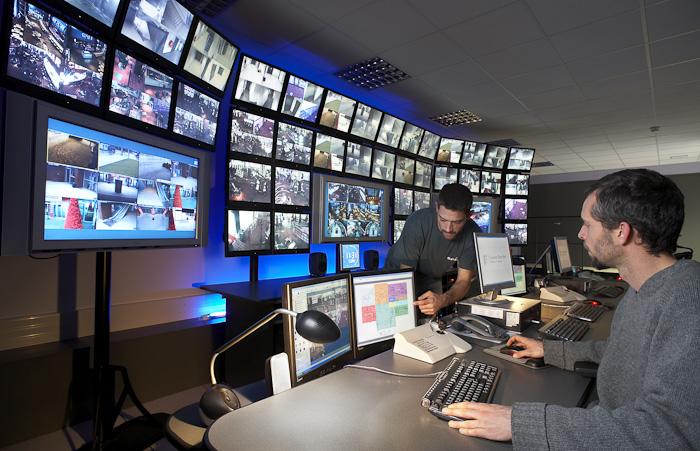If you’ve a regular rider of the MBTA, you’ve undoubtedly noticed a proliferation of surveillance cameras during the last few years. Maybe you’ve watched yourself in the video monitors over the northbound E-Line platform at Park Street. Maybe you’ve played “count the surveillance cameras” while walking through Downtown Crossing. Maybe you’ve stood on the railing and went eyeball to eyeball with the camera on the stairs leading to the Porter Square commuter rail platform. Or, maybe you just politely wave as you walk by.
Last spring, I requested a copy of the MBTA’s polices for the use of surveillance camera footage. According to the MBTA/MassDOT, video footage is (generally) kept for 30 days, and (generally) stored in the MassDOT’s two data centers. Access is granted on a strict need to know basis, and all requests not relating to criminal activity are logged and archived for later reference.
I was interested in seeing what kinds of not-related-to-criminal-activity requests were being made, and I asked MassDOT for a months worth of request forms (those filed in January 2014). There’s nothing terribly special about that month. I made the initial request in 2014, and January is the first month of the year. Here’s the general timeline for how my request was processed:
- 11/29/2014. I submitted a public records request to MassDOT, asking for copies of Video Access Request Forms submitted during Jan 2014.
- 12/6/2014. I received MassDOT’s acknowledgment of my public records request. MassDOT has assigned this case #14-0785.
- 1/15/2015. I received a letter from an MBTA attorney, informing me that the fee for processing my request would be $81.40.
- 1/17/2015. I sent the MBTA a check for $81.40, to cover processing fees.
- 2/24/2015. MassDOT sent the responsive documents.
In my experience, a three-month turnaround time isn’t too bad. However, the fees are another story. I received 22 pages of responsive documents from MassDOT, bringing the average cost to $3.70 per page. I’m glad I only asked for one month’s worth of records: if January 2014 was an average month, then I’d expect there to be 22 * 12 = 264 video access requests per year, and the associated processing fee would have been $81.40 * 12 = $976.80. A kilo-buck would be a little too steep for me.
This illustrates how Massachusetts’ public records law doesn’t do much for lower, middle, or working class people. If you want something interesting, you’ll need enough expendable income to pay the processing fees.
At any rate, now that we have 22 pages of video request forms, let’s see what we can discern from them.
Six requests give a purpose of “investigation”, with most of the details redacted.
Four requests are for “rules violations”. One of these mentions “failure to board customer/wheelchair”, which gives me the impression that these involve various violations of employee rules.
Six requests are related to “harassment”, “discipline”, “failure to report”, and customer complaints. Again, the subject seems to be MBTA employees.
Four requests are related to equipment problems. There’s a request for the purpose of checking gate functions at Back Bay station; two requests regarding a train moving with its doors open; and one regarding a derailment at Orient Heights. The two “train moving with doors open” were dated Jan 16th — I hope there was only one train involved.
The final two deal with an auto/trolley accident on Jan 24th, and a set of keys left in a customer service booth.
I was surprise to see that nearly 50% (10 of 22) of the requests were human-resource related. The next biggest surprise was the number of requests relating to equipment issues. At this point, I have to give a shout out to an article that Emily Hopkins wrote for the weekly dig:
To illustrate that point, [Kade] Crockford has a favorite anecdote about the fiscal cost of the modern police state: At the Downtown Crossing T stop, garbage bins sit below leaks in the ceiling. Right next to them are security cameras, devices she says have been updated several times in the past few years — billions spent to “watch our infrastructure rot.”
Yes, Kade and Emily, the MBTA really is using its surveillance cameras to watch its infrastructure rot. I’m sure the irony won’t be lost on T riders who suffered through last winter’s service collapse.
To close, below are links to two pdf documents. The first contains copies of my correspondence with the MBTA; the latter contains the responsive documents themselves.
The responsive documents have “employee #” fields. Although the MassDOT attorney(s) did not redact this information, I did. Part of me wants to think “if the attorney didn’t redact it from a public records response, then there should be no problem with showing it to the public”. On the other hand, I’ve seem plenty of MBTA keypad locks next to placards that say “enter employ number for entry”. On the remote chance that these numbers might be door combinations, I’ve decided to scratch them out.
MassDOT Video Public Records Correspondence
MassDOT Video Public Records Response


*shakes head sadly* I still really enjoy that we can request these documents, even if an ordinary person wouldn’t be able to do much with them. Keep rockin’ those freedoms!